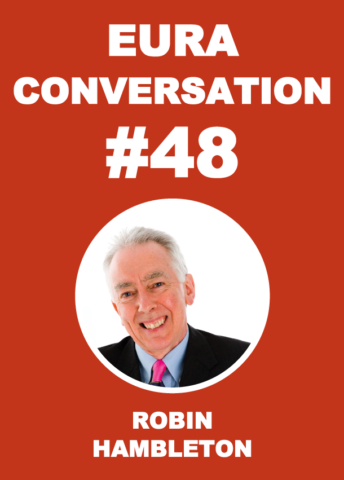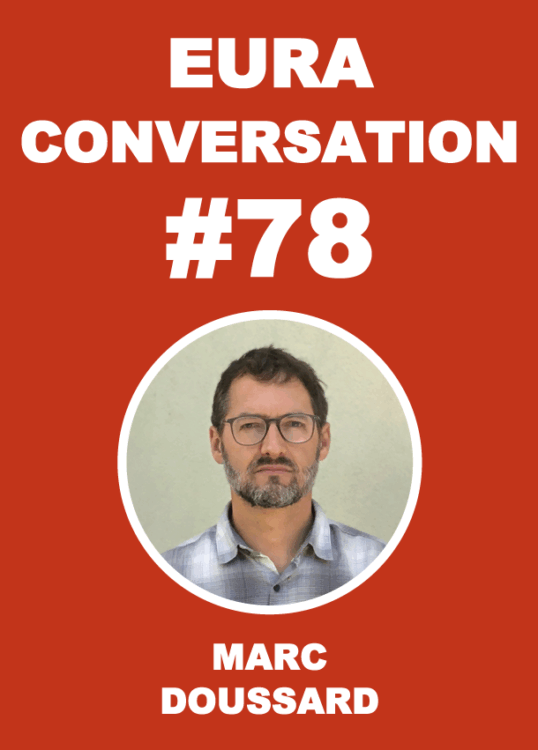
EURA 2023 – Call for panel submission
07/11/2022
Urban Research & Practice – Volume 15, Issue 4
05/12/2022Conversation #48
The radical right threat to cities and communities
by Robin Hambleton
University of the West of England, United Kingdom
 In recent months, serious newspapers in many different countries have drawn attention to the rise of the far-right in Europe. More than a few political commentators fear that recent developments could amount to a game-changing surge in support for nationalist, Eurosceptic, anti-immigrant, culturally intolerant political parties.
In recent months, serious newspapers in many different countries have drawn attention to the rise of the far-right in Europe. More than a few political commentators fear that recent developments could amount to a game-changing surge in support for nationalist, Eurosceptic, anti-immigrant, culturally intolerant political parties.
Three political events, that took place in September, lend weight to these claims.
In Sweden, the general election saw a rise in support for the radical-right Swedish Democrats to the point where, by a fine margin, a right-wing bloc was able to unseat the Swedish Social Democratic Party and their partners.
In Italy, a centre-right coalition, led by Giorgia Meloni’s Brothers of Italy, a radical-right party with neo-fascist roots, won an absolute majority of seats in the Italian Parliament.
Meanwhile, in the UK, Boris Johnson, the right-wing, and now disgraced, former Prime Minister, was forced to resign in early July. However, this did not result in a move in British politics towards the political centre.
Rather, in September, following a bizarre leadership contest in which only the 170,000 members of the UK Conservative Party could participate, Tory members elected Liz Truss, an uncompromising and dogmatic right-wing ideologue to take over as leader of the country.
Reflecting the fact that her policy agenda was entirely misguided, Ms Truss crashed the British economy and was, on 22 October 2022, forced to resign as Prime Minister having been in office for only 44 days. She was replaced by Rishi Sunak, another right-wing, Conservative politician, who is now imposing devastating cuts on public services.
In this contribution to EURA conversations, I explore two questions: 1. Are the political commentators right about this ‘recent’ surge in support for the far right? And 2. What, are the implications for cities and communities in European countries?
Is the rise in right wing thinking a recent development?
Colleagues in Eastern Europe will point out that right-wing figures exercising national leadership is not a new phenomenon. For example, in Hungary, Victor Orban, leader of the Fidesz, has been in power since 2010, and has been worryingly effective in taking control of the national media and suppressing democratic opposition voices. In Poland, Andrzej Duda, another right-wing politician, and a member of the Law and Justice Party, was elected in 2015.
Taking an even longer view we can see that the shift to the radical right has, in truth, been unfolding over a forty-year period. Right-wing think-tanks, funded by ‘dark money’, meaning funding provided by undisclosed benefactors, have had great success in promoting neoliberal views (Jones, 2014). The central belief in this right-wing ideology is that the tax burden on the wealthy should be lowered because, when coupled with deregulation of, for example, land use planning laws and environmental standards, these tax cuts will stimulate economic growth. Social objectives are achieved, so the argument goes, because the benefits of this growth will automatically ‘trickle down’ to the less well off.
There is no evidence to support this false claim. As explained by Nobel Prize-winning economist Joseph Stiglitz, and other respected economists, there is no such thing as a ‘free market’. Elected governments are always key players in shaping market behaviour, and governments need to act decisively to ensure that markets behave in a way that brings about desirable social, economic, and environmental outcomes (Stiglitz, 2019).
What are the implications of radical right policies for cities?
The threat to cities and communities is substantial. While the radical right operates in different ways in different countries, and political struggles vary in different contexts, seven worrying values tend to feature in right-wing thinking and practice:- Prize the individual over the collective;
- Favour private wealth over community wellbeing;
- Pay little or no regard to social justice, and helping the least well off in society;
- Take steps to denigrate, or ‘other’, non-white people, immigrants, gay people, trans people and other minorities;
- Disregard or downplay the current climate and ecological emergencies;
- Act to weaken local, regional, and central government democratic institutions; and
- Erode the rights of citizens to demonstrate and protest in public spaces.
Allow me to close by highlighting three developments that can, perhaps, offer some hope and encouragement at this difficult time. They suggest that, in various ways, misguided neoliberal ideas and policies can be, and are being, resisted.
First, we can note that, as documented in many contributions to this EURA Conversation series, the COVID-19 pandemic has spurred a strong communitarian impulse in people to protect one another. We have seen, amidst all the suffering, a wonderful upsurge in human kindness. A growing number of citizens now recognise that wellbeing isn’t individual but social. There is also a much better understanding of the fact that a healthy community isn’t just about people, it includes air, water, soil, plants, and other animals.
Second, cities across the world are leading the way in developing progressive policies and solutions to modern societal challenges. As I document in my recent book, Cities and communities beyond COVID19, civic leaders in many cities are co-creating initiatives that are entirely progressive in intent – they emphasise caring for people, caring for communities and caring for the planet (Hambleton, 2020).
Third, international city-to-city networking is on the rise. In a small way EURA members, and urban scholars more broadly, can play a role in spreading understanding about how to lead, plan and govern localities in ways that are inclusive and aim to advance social, economic, and environmental justice. They can do this through their teaching, their publications and, of course, through activism in their local communities.
References:
Hambleton R. (2020). Cities and communities beyond COVID-19. How local leadership can change our future for the better. Bristol: Bristol University Press.
Jones O. (2014). The Establishment and how they get away with it. London: Allen Lane.
Stiglitz JE. (2019). People, power, and profits. Progressive capitalism for an age of discontent. New York: W.W. Norton.







Why do we not understand the primary threats of the radical right? It could be because we do not understand the nature of borders. Many people expect borders to give them so-called ‘protections’ that, in a globalising world, they cannot possibly provide. National borders cannot bring about so-called ‘safety’ from people in ‘other’ parts of the world in the face of escalating poverty, climate change, and pandemics. But some citizens do not seem to understand this – many pin their hopes on walls and restrictions.
I agree with Robin that the rise in right-wing thinking is not a recent development. I would argue that Eastern Europe has not led the way in providing examples of right-wing figures exercising national leadership in recent decades. The radical right has a long history all over Europe – the careers of Victor Orban and Marie Le Pen are simultaneous. And, in the 1980s and 1990s, we witnessed the rise of Jörg Haider in Austria, and Silvio Berlusconi in Italy. All these examples tell a story of nationalism and anti-immigrant, right-wing economic views that go back a long way.
In my view the greatest risk for urban policy now coming from right-wing politicians concerns the centralisation processes they advocate. This is because centralisation can slowly kill a community’s self-awareness, and weaken the feeling that things can be changed for the better, a setback that can only be rebuilt in a long-duration processes. My remedies to this challenge are grounded in the work of Elinor Ostrom, the Nobel Prize-winning economist, who explained the importance of ‘caring for the commons’.
City mayors and civic leaders should build awareness of the interdependencies between the material and social dimensions of cities and borders and strengthen trust. Sylwia Dołzbłasz and I discuss this topic in a chapter that will be published in a new handbook on borders and tourism next year (Dołzbłasz, Szmigiel-Rawska 2022). In my view we, as human beings, need to understand boundaries, limits, and space – how much we truly have and, if we can, share with others. And, if we do, what consequences for ourselves can we expect, and what are going to be the consequences if we do not? Above all we need to learn what we can do to integrate.
References:
Dołzbłasz, S., and Szmigiel-Rawska, K. (2022) ‘Aurea Mediocritas: Cross-border Cooperation between Materiality and Relationality’, in Timothy D. J. and Gelbman A. (eds) Handbook of Borders and Tourism. Abingdon: Routledge. DOI:10.4324/9781003038993-6, pp. 61-72.
As a "commoner" myself, I studied under Lin at IU, I agree that self-governance through commoning represents an important counter-movement to right-wing radical policies. I'd like to overlay the idea of "urban social movements" on top of that, and how a global network of urban social movements (which common locally in urban spaces) could leverage online commons (the creative commons) to learn from one another and pool resources and ideas.
Formally you are right that right wing tendencies are reaching back to the 1980s and 1990s. However, Berlusconi’s first success was against the subvention of the poor south in Italy, as he wanted to compete with other rich and upcoming regions, and he got much support for “Northern Italy first”.
The case of Haider was totally different and its causes are dating back to 1955. To become independent from the Allied occupancy after World War II. Austria accepted to nationalize the core industries. From that time on, political parties (the conservative ÖVP and the Social Democrats SPÖ) became the power hubs. Almost all stakeholder positions were launched via party membership – in all industries, services, finance sector and in universities. They were either ‘black’ or ‘red’ and the bigger ones consisted of sections in these colours. Particular in Caryntia even posts of housekeepers and garbage collectors were implemented via party membership. Haider argued for transparency and uncover the party string pulls to save democracy. Due to these arguments he got the majority in Caryntia. Every second weekend he was in ORF-TV and a critical journalist and a left-wing political scientist, demographer etc. tried to “overcome” him – without any success. As result of the national elections in the late 1990s, the ÖVP candidate (3rd position) became Chancellor in coalition with Haider’s FPÖ (2nd), what made him ‘reasonable’. After that the FPÖ split three times, where the most radical wing was the most successful.
After the immigration of refugees in Austria, the national elections resulted in a kind of landslide victory, where particularly the socio-democratic regions where overtaken by the FPÖ; generally there was clash between rural areas and middle sized and bigger cities (what I realise in most European countries). This is not the only clash, if you remember car use, wokeness etc.
Dear Jens,
Thank you very much for this exciting clarification of the history of right-wing politics in Austria. It strikes me that the experience you describe is not so different from the experiences of Central European countries. What happened after World War II also divided societies here into two parts – those who were in opposition and those who supported an essentially populist and externally driven ruling party.This split did not disappear when the Berlin Wall came down in 1989. Rather it continues to shape the political scene today.
What can we do? I think ‘we should know better’. By this, I mean that international organisations, like EURA, should provide a source of knowledge that can help European societies respond to new tensions and challenges. To perform this function effectively, we should try to build our reputation as a reliable and trustworthy source of independent information and advice.
Allow me to provide an example from Poland. The Polish decentralisation reform of 1990 was remarkably successful – in a radical move, it created autonomous local governments in my country. The founding fathers of this success were university professors – Jerzy Regulski (1924-2015) and Michał Kulesza (1948-2013). These fine scholars learned about the importance of local autonomy while being active in academic work and collaboration, long before the opportunity for societal change in Poland arose. When the time came, they supported the systemic transformation towards local autonomy while maintaining academic independence and respect. My dream for EURA members – friends and colleagues – is to strive to replicate this kind of public, intellectual leadership.
Hi Kasia, thank you for your thoughtful comments. We agree that the rise of far-right politicians is very troubling, and we also agree that this rise is not a recent development. I welcome your suggestion that we should pay more attention to the ideas developed by Elinor Ostrom on ‘caring for the commons’. Her work on self-organising systems of governance is very relevant to this conversation.
My sense is that many EURA scholars are also troubled by the rise of far-right political parties. I hope that this exchange can stimulate further contributions that not only advance our understanding of current political changes, but also prompt suggestions on how develop progressive policies and practices as a counter to the radical-right.
I see the general cause for nationalist and right wing positions in the multidimensional and intense value shift. Almost all of us are against racism, injuries and prejudices against vulnerable groups. However, I doubt, that we are the majority in our societies. The modern liberal defend the success we reached via formal laws (triggered down from the UN, via EU and national states) and we are sensitive, if others are not political correct. Most of us accept the right for every minority, and from the middle classes downward the are see them lost and forgotten by the political class.
If you consider as well globalisation, digitalisation, climate change, weakening welfare states, pandemia, inflation, war and energy risks – there is no wonder that the trust in the government goes down to 20-30 percent. In these situations – we all know – people hanker after the ‘strong guy’, who make the complicated things easy. Moreover, Trump destroyed the ‘culture of democracy’ and Bolsonaro, Orban, Erdogan and others are following this model. What is shocking me the most, is that Elon Musk, Mark Zuckerberg, Peter Thiel and others use their big amount of money they made in Sillicon Valley to design the societies and democracies by their interest.
What can we do, what EURA can do? It must be more than writing books and articles, visit talk shows etc. We must find the way to the central power networks, to support central stakeholders in pro-active form of policies – maybe in the field against climate change (which is from my point of view the biggest challenge, as the Global North do not want to change economies and lifestyle – particularly not because of the multifold competition with China). Michael Burawoy laid a kind of thread with his Public Sociology, another field is to contribute in Science for Future. Our voices must be louder and more radical.
Hi Jens, good to hear from you! Thanks for your helpful insights on the evolution of right-wing politics in Austria. All three of us agree that right-wing tendencies reach back a long way, and your commentary on Austria supports this claim. I agree with your point that, in the face of modern complexities and tensions, some voters may believe that electing a ‘strong leader’, who offers easy answers, is an appropriate way forward. We know, however, that these so-called answers fail when they are introduced – and they often make things worse because they usually sew divisions in society.
You ask what can we do? In my view members of EURA can do two things: